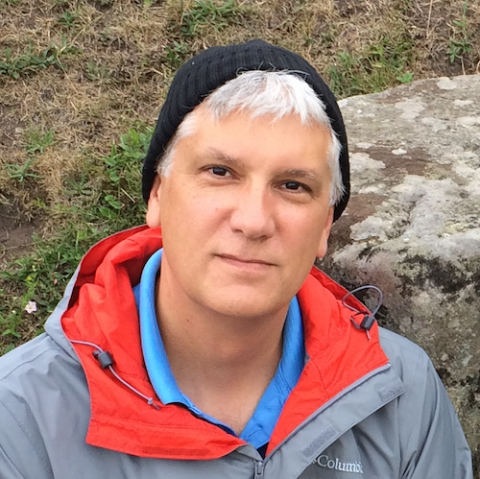Meet Outstanding Doctoral Mentor Dr. John Laudun
Dr. John Laudun is a professor of English whose research spans culture analytics, text mining, narrative studies, computational folkloristics, and creativity studies. 
He has been named a 2019-2020 Outstanding Doctoral Mentor by the Office of the Vice President for Research, Innovation, and Economic Development.
Effectively managing and providing resources is at the heart of his mentorship of students in the Ph.D. program in English.
“Each student is different, and each student has different needs as they move through a program and their own intellectual and professional development,” he says. “Sometimes they need little else than a sympathetic ear and someone who can give them confidence; sometimes they need someone to negotiate institutional necessities so that they can stay focused on their work and development.”
Since beginning his work in the field of folklore studies, Laudun has widened his focus to encompass “areas of overlap that exist between the humanities, the social sciences, and data and information science.”
His current research on the nature of narrative arose from his interest in “refining our understanding of modes of discourse so that we can more successfully not only distinguish narrative from other kinds of texts but build a better model of narrative itself.”
This research draws on work in information science, cognitive science, corpus linguistics, and computational approaches to the humanities and social sciences, in addition to folklore studies.
For graduate students interested in engaging in this kind of interdisciplinary research, Laudun advocates that they “break off a piece of the larger puzzle and try things out for themselves.”
When highlighting the accomplishments of some of his recent graduates, he is quick to credit the drive and talent they brought to the program.
“Gina Warren wrote a book under contract for her dissertation. She managed that process almost entirely on her own. Wanda Addison became a member of the American Folklore Society's Executive Committee. Wanda is Wanda, and she was that way before she ever met me. Someone like Sam Castleman finished her dissertation despite me furrowing my brow more times than I would care to admit, and it was very good work,” he says.
Success in graduate studies, Laudun explains, requires navigating how your personal interest in your subject matter can translate to your professional career.
“The key to success after graduate school is perhaps the same as the one during graduate studies: you have to find what you do interesting no matter its interest to the others immediately around you but you must also realize that there must be interest somewhere for your work to find an audience and for you to find a job. The key to understanding this is that, like any network, the people immediately around you don't need to be exactly like you, but they may very well link you to those who are.”
Ultimately, the goal of his mentorship work is to support students in developing their talents and recognizing their capabilities.
“The most rewarding thing about working with doctoral students is seeing an expert come into being,” Laudun says.
“For much of that time, they are unaware of their own, emergent, expertise, and then, perhaps at the defense or perhaps before or after, they realize that they know this incredible amount about this particular thing and that that has real power and consequence in the world. As a mentor, you are often lucky enough to be there when it dawns on them. That is why I do this.”
Learn more about earning your doctorate in English at the University of Louisiana at Lafayette.